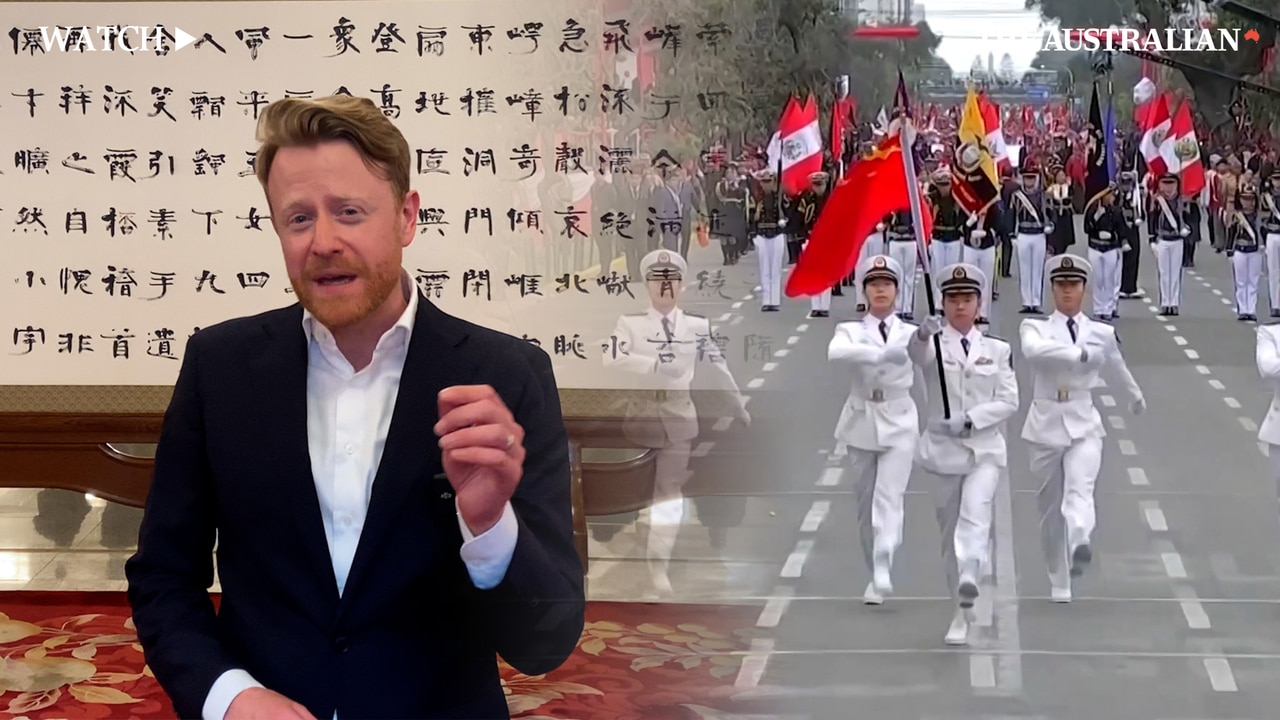Of course China is preparing for war with America
It has been the guiding star of the Chinese PLA since at least the fall of the Soviet Union in 1991 when America replaced the USSR as the military threat that most worried Beijing.

China’s Foreign Ministry has slightly walked back its war talk but let’s not kid ourselves – of course Beijing is preparing for war with America.
That has been the guiding star of the Chinese People’s Liberation Army since at least the fall of the Soviet Union in 1991, when America replaced the USSR as the military threat that most worried Beijing.
Why else do you think Beijing increased its military budget by another 7.2 per cent this week? To strengthen its defensive lines ahead of a Mongolian invasion from the north?
Foreign Ministry spokesman Lin Jian kicked off the war talk on Tuesday during a lengthy answer on America’s new 10 per cent tariffs on China.
At the end of a long sermon about the Trump administration’s “blackmail” over America’s fentanyl crisis, came the kicker.
“If war is what the US wants, be it a tariff war, a trade war or any other type of war, we’re ready to fight till the end.”
Asked the following day if China fully stood by that pugnacious statement, republished by China’s embassy in America, Mr Lin didn’t correct the comments – but he was a bit less vivid.
“If the US has another agenda in mind, and if harming China’s interests is what the US wants, we’re ready to fight till the end.”
US Defence Secretary Pete Hegseth then responded on Fox News’ Fox & Friends, declaring the US was “prepared” to go to war with China.

Context matters here.
Firstly, both Beijing and Washington cast themselves as the defensive party. Neither wants to look weak, but Donald Trump and Xi Jinping are not so insane as to be eagerly looking for war with their greatest military opponent. This war talk is posturing by attack dogs in their respective administrations.
Secondly, it is all taking place during China’s pre-eminent political meeting, the “Two Sessions”.
It’s a highly choreographed affair, which Xi and his comrades use to project confidence in their management of China.
That Washington timed its latest 10 per cent tariff on imports from China during the event bristled. That Trump linked the new tariffs explicitly to what he says is China’s responsibility in America’s opioid crisis pressed deep historical wounds.
The Chinese Communist Party’s origin story is tied up with the 19th century’s opium wars and Britain’s use of military might to open up the Chinese market to its trading merchants.
A giant museum in Beijing celebrating the CCP, whose construction was personally overseen by Xi, begins with this episode.
“With a history stretching back more than 5000 years, the Chinese nation is a great and ancient nation that has fostered a splendid civilisation and made indelible contributions to the progress of human civilisation,” begins the Museum, which opened in 2021.
“After the Opium War of 1840, however, China was gradually reduced to a semi-colonial, semi-feudal society due to the aggression of Western powers and the corruption of feudal rulers.
“The country endured intense humiliation, the people were subjected to untold misery, and the Chinese civilisation was plunged into darkness.”
A dark exhibit, with a backdrop of flames and images of brutalised Chinese and haughty-looking European armies, hammers home the lesson. A PLA delegation was studying it when I visited earlier in the year.
The rest of Xi’s enormous museum tells the story of how his Communist Party built today’s China, a state so strong it will never be pushed around again.
Displays show the increasingly sophisticated military equipment China is buying with a budget that has now hit 1.784665 trillion yuan ($398bn), although analysts believe the true amount is much higher.
To Australian eyes, the official amount – eight times what Canberra spends on defence – is intimidating enough. But, as Beijing points out, it is still far below America’s military expenditure.
China has never been so strong in the modern era, but it has grown into a great power with a peculiar mix of self-assertion and deep anxiety. Trump’s America shares some of that uneasy duality.
What follows this week’s tariff tit-for-tat and war talk will turn on the relationship between Trump and Xi, the two most important figures on the international stage.
Both men have towering egos, an unshakeable belief that their respective nations are destined to be the most powerful on earth, and each brazenly assert territorial claims in defiance of international law.
What could possibly go wrong?




To join the conversation, please log in. Don't have an account? Register
Join the conversation, you are commenting as Logout